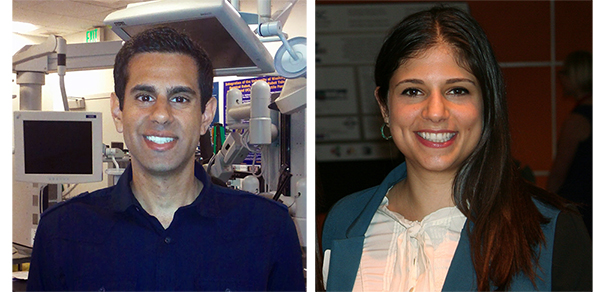As the pace of innovation is speeding up elsewhere, health care innovation lags behind. Can a hackathon help?
What can health care learn from contemporary approaches to digital innovation? Can an entrepreneurial, innovation-forward approach actually impact the health care industry? UCLA's Entrepreneurship Council and Business of Science Center are attempting to answer exactly these kinds of questions in their upcoming Innovation Week and Inventathon. I talked to Shyam Natarajan and Christina Vorvis to find out more about their hopes for the event.
Natarajan is a medical device researcher working on prostate cancer, and Vorvis is a Ph.D. student at UCLA studying pancreatic cancer. Together they are helping to organize UCLA's Innovation Week and Inventathon, a week-long event encouraging entrepreneurship in the health care arena.
What is Innovation Week and the Inventathon, and why is it important?
SN: UCLA Innovation Week, beginning October 1, is the first time that entrepreneurial organizations on campus are coming together en masse to catalyze startup formation. Each day of this week features a unique campus resource and provides students, staff, and faculty with an opportunity to experience entrepreneurship. Christina and I are working with the Business of Science Center, along with the UCLA Entrepreneurship Council to host panel sessions, open pitching forums, workshops, and two competitions. Our goal is to help students discover entrepreneurship as a career, and find a co-founder or interesting project to work on.
CV: Exactly. The Inventathon is a 24-hour competition starting on October 4, where teams of 3-5 people work together to develop solutions for unmet medical needs. This event is similar to a hackathon in concept, and includes students with a variety of skillsets. We've invited students from engineering, medical, business, arts, and design backgrounds to participate. As far as we know, this is the first time a health care-focused hackathon has taken place in Southern California. To be frank, it makes perfect sense that UCLA is the place to do it since we have the Ronald Reagan UCLA Medical Center across the street from cutting-edge research laboratories in science and engineering.

I understand that you worked with the UCLA hospital to come up with unmet needs in health care for the Inventathon. Who did you work with to identify those needs, and can you describe some of the unmet needs that were identified?
SN: We interfaced with physicians, nurses, administrators, and other clinical staff associated with UCLA Health. This effort was modeled after an existing program at UCLA called Advancing Bioengineering Innovations (ABI). In ABI, full-time fellows shadow clinicians and conduct ethnographic research to produce a list of unmet medical needs. This list is then brought into a classroom, where student teams develop solutions over a 20-week period.
CV: For the Inventathon, we generated a new list, which will be released during Innovation Week so that teams can start on relatively equal footing. I can't announce the needs here but an example might be something like reducing the number of urinary tract infections associated with catheterization.
Because of regulatory constraints, innovation in health care can be much slower than innovation in the tech space. Can something like the Inventathon help speed up the pace of innovation in health care? If so, how?
SN: There is a growing trend in the number of mobile devices that modify or augment health care delivery. Even the FDA has taken notice, and approved the first diagnostic imaging mobile app in 2011. Although we can't change the federal regulatory process, events like the Inventathon can help stimulate new ideas and business models that improve health care.
What kinds of products do you expect to see come out of the Inventathon?
CV: We expect to see teams come up with mobile applications, digital services, and embedded devices that tackle an important question in health care. What I hope to see are innovative solutions to clinical problems that I've never imagined or thought about before.
What are you personally most excited about with respect to Innovation Week and the Inventathon?
SN: Both Christina and I work in cancer research, where it can take many years and millions of dollars in funding to make an advancement. Unlike therapeutic drugs, medical devices and software applications have a shorter timeline to commercialization. At Innovation Week, we are particularly excited to connect campus inventors with other entrepreneurial minds to accelerate this process. We may even see a few ideas take off and become products that benefit patients and health care providers.
CV: I agree! Shyam and I are personally and professionally invested in making UCLA an entrepreneurial campus. We are truly thrilled that we've built this platform where students can learn about health care entrepreneurship, participate in the rapidly-growing LA startup community, and come up with the next big idea that will change the world.
